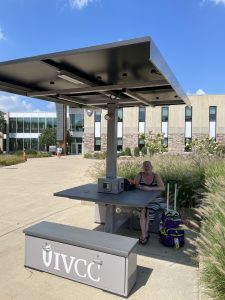‘Women Speaking:’ by Dr. Radek-Hall
April 4, 2019
Dr. Kimberly Radek-Hall presented “Supreme Justice, Women Speaking Truth to (and against) Power” on March 25 in room CTC-125.
During the presentation, Radek-Hall talked about two important hearings—the case of Anita Hill and the more recent case of Christine Blasey-Ford. She presented a lot of information about the topics, explaining what happened in each and their historical significance.
Radek-Hall began the presentation by talking about Anita Hill and Supreme Court Justice Clarence Thomas.
This case was important because it revealed that many men, especially men in power, did not know the reality of sexual harassment women face every day. The senators were surprised that Hill would keep working with Thomas if he did the things she accused him of.
It also brought on a feminist awakening among women who watched the hearing and became upset with the outcome. As a result of this exposure to sexual harassment, charges of inappropriate sexual misconduct in the workplace increased after 1992.
The second case Radek-Hall called to attention was that of Blasey Ford and the newly seated Supreme Court Justice Brett Kavanaugh.
Radek-Hall brought this case to the conversation because Ford was initially afraid of accusing Kavanaugh as she was below his financial and social statuses.
This is the unfortunate truth for many women who face sexual harassment in their lifetimes. Their credibility being questioned in a court is both embarrassing and humiliating, enough to make many women choose to not testify at all.
While discussing the Ford-Kavanaugh case with the audience, Radek-Hall took a moment to show a spoof of the hearing produced by “Saturday Night Live,” which parodies Kavanaugh’s over the top mannerisms and oddities.
The audience received the clip very well, which brought to the table another conversation of media coverage on cases such as this.
Radek-Hall admits, “The media goes a little bit crazy,” but also that satire can help people learn and be informed of what is going on.
However, she also mentioned, “Treating news like it’s entertainment does not help.” There needs to be a balance.
When asked if there is any hope for the future, Radek-Hall expressed that she has faith in the younger generation: “They are statistically less racist, less homophobic—millennials are less religious and also the least likely to vote.”
To close her informative session, Radek-Hall encouraged the audience to get out and vote as a way to express themselves and pave way for a brighter future.




